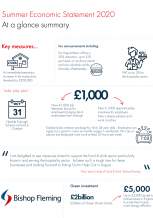Summer Economic Update 2020 at a glance
Summer Economic Update 2020 announcements made on 8 July 2020.
“jobs, jobs, jobs” is the theme of Chancellor, Rishi Sunak's second Budget in four months as he seeks to insulate people and businesses from the ravages of an economic winter, unveiling new job creation schemes to help counteract rising unemployment.
More than two million jobs could be lost when the furlough scheme ends in October, and the country could be facing the worst recession since the Great Frost of 1709, according to the Chancellor. In two months this year, GDP dropped 25%.
Building on last week's "Build, build, build" speech from the Prime Minister, there are new work placements with the government covering the minimum wage for young workers, and employers will be offered incentives to create more apprenticeships.
There is a new jobs retention bonus – bring someone back who was furloughed and employ to at least Jan 2021 and the government will pay the employer £1,000 per employee. The employee must be paid at least £520 per month on average.
Key tax announcements include an immediate temporary increase in the stamp duty threshold to £500,000 until 31 March 2021 and a VAT cut to 5% for the hospitality sector.
Eat out offer. For the month of August there will be a 50% reduction, up to £10 per head, on sit-down meals and non-alcoholic drinks Monday-Wednesday.
The Chancellor also unveiled a £3 billion green jobs package, including vouchers for people to insulate their homes through loft, wall and floor insulation.
Chancellor speech extract on jobs:
"As part of the plan to support jobs, a Job Retention Bonus will be introduced to help firms keep furloughed workers. UK Employers will receive a one-off bonus of £1,000 for each furloughed employee who is still employed as of 31 January 2021.
A new £2 billion Kickstart Scheme will also be launched to create hundreds of thousands of new, fully subsidised jobs for young people across the country. Those aged 16-24, claiming Universal Credit and at risk of long-term unemployment, will be eligible. Funding available for each six-month job placement will cover 100% of the National Minimum Wage for 25 hours a week – and employers will be able to top this wage up.
A total of £1.6 billion will be invested in scaling up employment support schemes, training and apprenticeships to help people looking for a job. Young people, who are amongst the worst hit by the crisis, will benefit from this. This includes:
- Businesses will be given £2,000 for each new apprentice they hire under the age of 25. This is in addition to the existing £1,000 payment the Government already provides for new 16-18-year-old apprentices and those aged under 25 with an Education, Health and Care Plan.
- A £111 million investment to triple the scale of traineeships in 2020-21 ensuring more young people have access to high quality training.
- £17 million of funding to triple the number of sector-based work academy placements in 2020-21
- Nearly £900 million to double the number of work coaches to 27,000;
- Over a quarter of a million more young people to benefit from an extra £32 million investment in the National Careers Service."
VAT cut commentary
The Chancellor has announced a reduction on the rate of VAT to 5% from 15 July 2020 to 12 January 2021 for the following supplies:
- Food and non alcoholic drinks sold by restaurants, pubs, bars, cafés and similar premises
- Supplies of accommodation
- Admission to attractions, including zoos and cinemas
More detail is to follow from the government but key issues for businesses which provide hospitality will be how the change will affect their pricing and how they will identify the sales which are subject to the reduced rate where they also sell alcohol, which will still be subject to VAT at 20%
Food and Drink Partner, Fleur Lewis commentary
Delighted to see measures aimed to support the food & drink sector, particularly those in and serving the hospitality sector. Its been such a tough time for these businesses. I'm looking forward to Eating Out to Help Out in August.
Stamp Duty cut
The cut in stamp duty for England and Northern Ireland applies from midnight 7 July 2020, and means that anyone completing a purchase of a main residence today (8 July) will benefit from the saving. Anyone completing on a house yesterday will feel aggrieved that they will have lost out.
Scotland and Wales have different systems.
Stamp Duty at 5% remains payable for purchases above £500,000 (up to £925,000), rising to 10% (£925,001 - £1,500,000) and 12% (over £1,500,000).
Anyone purchasing an additional residential property worth more £40,000 will still need to add a 3% stamp duty surcharge to their costs.
We have pulled out the key announcements from the Budget below, and we will follow this up with commentary on relevant issues.
Brief recap – key changes previously announced:
- Flexible Furlough Scheme
- Self Employed Income Support Scheme
- Other Covid 19 financlal support
- £10m for the tourist industry
- £1.57bn for cultural sector
- Zero rate VAT on PPE to 31 October 2020
- Corporation tax to remain at 19%
- CGT - 30 days to pay tax on sale of a UK residential property.
- IR35 roll out to private sector postponed until April 2021.
- Entrepreneurs' Relief - Lifetime limit reduced from £10m to £1m from 11 March 2020 (no change for Investors' Relief)
Summer Economic Update 2020 key measures announced:
- There will be a Budget and Spending Review in the autumn
- Flexible Furlough Scheme will end in October
- New Job Retention bonus for employers bringing back employees from furlough
- Kickstart Jobs creation package for 16 to 24 year olds - Employers can apply for a grant to cover six months wages + overheads. No cap on places, but employee must work at least 25 hours per week
- New £1,000 apprenticeship incentives for employers
- New careers advisers and work coaches
- £2bn green homes grant to make homes more energy efficient
- Temporary cut in stamp duty - raising the threshold from £125,000 to £500,000 - until 31 March 2021
- VAT rate cut for the hospitality sector to 5% from 15 July 2020 to 12 January 2021
- August discount for Monday to Wednesday eating out - £10 per head
Read our additional commentary
- New VAT cut provides food for thought
- Stamp Duty cut opens door to home ownership
- A grand scheme to bring back furloughed workers
- Eat Out to Help Out in August
- Listen to Partner Chris Walklett's review of the Update on SoundCloud
Further information
- Plan for jobs document
- Chancellor's speech
- House of Commons Library - Background Briefing to the Summer Economic Update
- Background briefing from the Institute for Government
- IFS reaction
Tax Tables 2020/21
Tax rates and allowances can be downloaded here.
Finance Bill 2020
The Finance Bill 2020 is making its way through the Parliamentary process, and will have its Second Reading in the House of Lords on 17 July 2020.
The government will publish draft clauses for the next Finance Bill on 21 July 2020, along with accompanying explanatory notes.
Related items
- HM Treasury Spring Budget 2020.
- HM Treasury Spring Statement 2019 page
- Bishop Fleming's 2019 Spring Statement analysis: download here.
[Gary Mackley-Smith]







